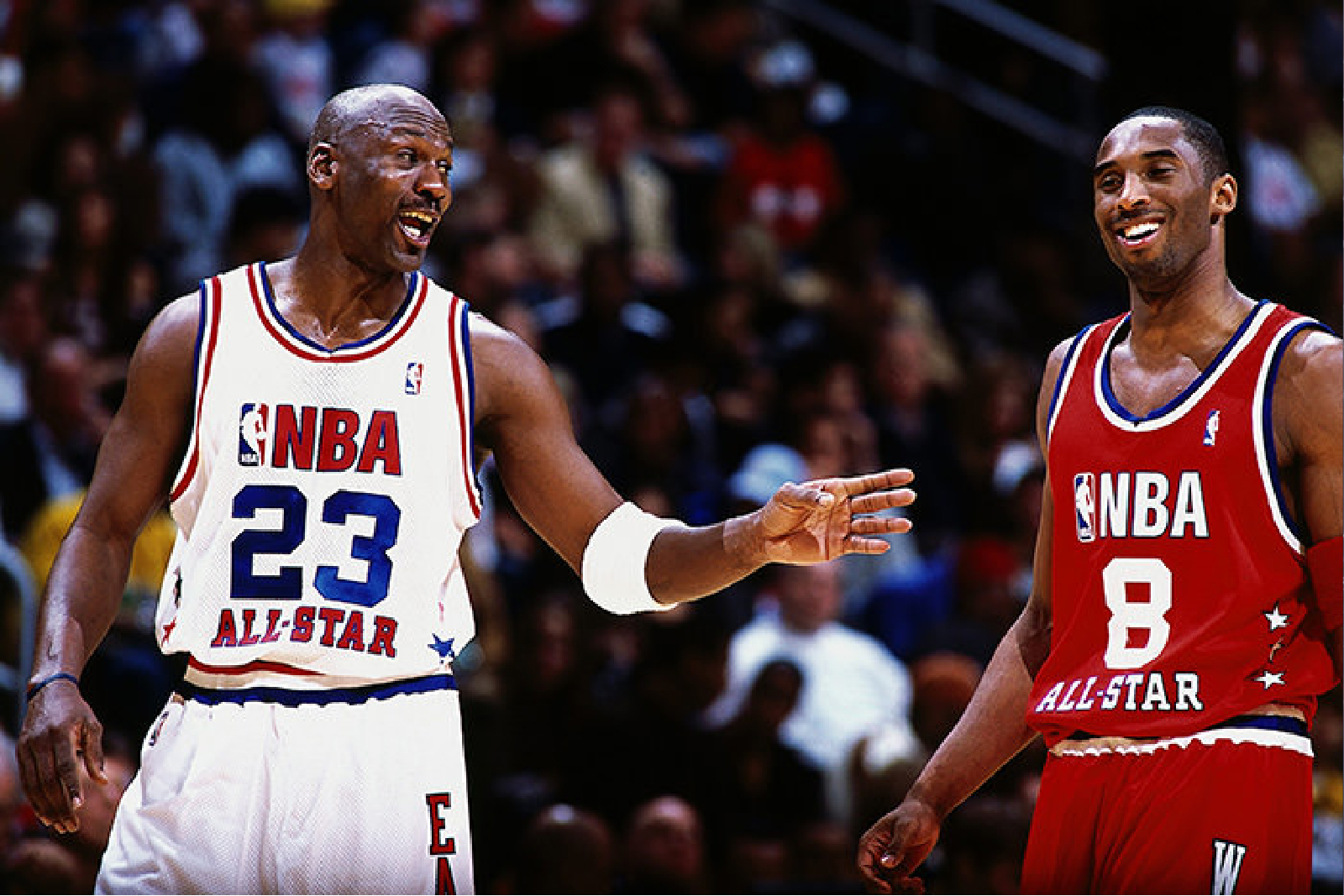Michael Jordan, often hailed as the greatest basketball player of all time transcended the sport and left an indelible mark on its history. From his early life to his unparalleled success with the Chicago Bulls, Jordan’s journey is one of triumph, perseverance, and excellence. This blog post delves into the multifaceted career of Michael Jordan, exploring not only his on-court achievements but also his impact on popular culture and the global basketball community.
Fast information
| Information | Details |
|---|---|
| Full Name | Michael Jeffrey Jordan |
| Date of Birth | February 17, 1963 |
| Place of Birth | Brooklyn, New York, USA |
| Parents | James Jordan Sr. (Father), Deloris Jordan (Mother) |
| High School | Emsley A. Laney High School |
| College | University of North Carolina (UNC) |
| NBA Debut | Chicago Bulls (1984) |
| NBA Championships | 6 (1991-1993, 1996-1998) |
| Business Ventures | Air Jordan Brand, Charlotte Hornets |
| Career Scoring Avg. | 30.1 points per game |
II. Early Life and Career Beginnings
Michael’s Roots and Introduction to Basketball
Michael Jeffrey Jordan was born on February 17, 1963, in Brooklyn, New York. Raised in Wilmington, North Carolina, Jordan’s early affinity for sports, particularly basketball, became apparent. His father, James Jordan Sr., played a pivotal role in fostering his love for the game.
From Aspirations to Achievements
Jordan attended Emsley A. Laney High School, where his basketball prowess began to shine. Despite facing initial setbacks, such as being cut from the varsity team in his sophomore year, Jordan’s determination fueled his rapid improvement. By his junior and senior years, he became a standout player, showcasing the skills that would define his illustrious career.
Notable High School Achievements
- Averaged a triple-double in his senior year: 29.2 points, 11.6 rebounds, and 10.1 assists per game.
- McDonald’s All-American and Parade All-American in 1981.
Michael Jordan journey from high school to college marked the beginning of a legendary basketball career that would unfold on a global stage.
III. College Basketball Success
Michael’s College Stint: The Tar Heels Era
Jordan’s collegiate career at the University of North Carolina (UNC) further solidified his status as a basketball prodigy. Playing under coach Dean Smith, he became a key player for the Tar Heels, showcasing a scoring ability that set the stage for his future NBA dominance.
Highlighting UNC Achievements
- NCAA Championship in 1982: Jordan made a lasting impact with the game-winning shot against Georgetown, securing the title for UNC.
- NCAA Player of the Year in 1984: Recognition of Jordan’s exceptional skills and leadership on the college court.
Shaping the NBA Draft
After three standout seasons with UNC, Michael Jordan declared for the NBA draft in 1984. The Chicago Bulls selected him as the third overall pick, setting the stage for an extraordinary professional career.
There are rumors and stories about Carolin Musiala’s business acumen, her role as a mother, and her philanthropic efforts. This unknown story of Carolin Musiala Vanoy adds another layer to the picture of a woman who is more than just the ex-wife of a celebrity. She is a character who deserves respect and admiration for the way she has managed her life, her family, and her businesses Carolin Musiala.
IV. NBA Draft and Rookie Season
NBA Debut: Chicago Bulls
Entering the NBA with high expectations, Jordan quickly demonstrated that he was a force to be reckoned with. His rookie season with the Chicago Bulls in 1984-1985 was a showcase of raw talent, determination, and an unmatched work ethic.
Key Moments from Rookie Season
- NBA All-Star Game: Jordan’s impressive debut earned him a spot in the All-Star Game, a rarity for rookies.
- Scoring Averages: He finished the season with an outstanding average of 28.2 points per game.
Rookie of the Year Accolade
Jordan’s impact was recognized as he secured the NBA Rookie of the Year award, a clear sign of the greatness that was just beginning to unfold in the league.
V. The Chicago Bulls Era
Dominance and Championships
The Chicago Bulls era, often synonymous with Michael Jordan’s peak, witnessed unparalleled success. Jordan’s partnership with coach Phil Jackson and fellow Bulls legend Scottie Pippen formed the foundation of a basketball dynasty.
Championships and Records
- First Three-Peat (1991-1993): The Bulls secured consecutive NBA championships, solidifying their place as the team to beat.
- Second Three-Peat (1996-1998): A remarkable comeback after Jordan’s brief retirement, adding three more championships to their legacy.
Notable Moments
- “The Shot” against Cleveland: Jordan’s buzzer-beater in the 1989 playoffs is etched in NBA history.
- 72-10 Season (1995-1996): The Bulls set a regular-season record for most wins, a testament to their dominance.
Global Icon
Jordan’s impact wasn’t confined to the court. His charisma, skill, and competitive spirit turned him into a global icon, transcending basketball and influencing popular culture worldwide.
VI. Retirement and Comebacks
First Retirement (1993-1995)
Following the tragic death of his father in 1993, Michael Jordan stunned the sports world by announcing his retirement from basketball. During this hiatus, Jordan explored a brief stint in baseball, paying homage to his father’s passion.
The Baseball Interlude
- Birmingham Barons: Jordan played minor league baseball with the Chicago White Sox affiliate, showcasing his versatility as an athlete.
- Return to the Bulls: In 1995, Jordan made a triumphant return to basketball, rejoining the Chicago Bulls.
Second Retirement (1999-2001)
After securing a second three-peat with the Bulls, Jordan retired again in 1999. This time, he shifted his focus to the Washington Wizards, taking on both ownership and a front-office role.
The Wizards Era
- Player-Executive Role: Jordan returned as a player for the Wizards in 2001, displaying enduring skill despite his age.
- Final Retirement: In 2003, Jordan officially retired from professional basketball, leaving an unmatched legacy.
VII. Off the Court: Business Ventures and Legacy
Entrepreneurial Pursuits
Michael Jordan’s impact extends far beyond basketball courts. His business acumen and strategic investments have solidified his status as one of the most successful athlete entrepreneurs.
The Air Jordan Brand
- Partnership with Nike: The launch of the Air Jordan brand in 1984 revolutionized athlete endorsements and sports merchandising.
- Cultural Phenomenon: The iconic Jumpman logo and innovative designs turned Air Jordans into a cultural symbol, transcending sports.
Philanthropy and Community Engagement
- Jordan Brand Philanthropy: Through initiatives like the Jordan Fundamentals Grant Program, Jordan has contributed significantly to education.
- Community Impact: His commitment to various charitable causes showcases a dedication to giving back.
Beyond Basketball: Film and Ownership
- Space Jam (1996): Jordan’s foray into acting with “Space Jam” showcased his crossover appeal.
- Charlotte Hornets Ownership: Jordan became the principal owner of the Charlotte Hornets in 2010, further solidifying his influence in the NBA.
Legacy Off the Court
Michael Jordan’s influence as a businessman, philanthropist, and cultural icon underscores a legacy that reaches well beyond the confines of a basketball court.
VIII. Impact on Basketball Culture and Sneaker Industry
The Air Jordan Legacy
Michael Jordan’s influence on basketball culture is most evident through the enduring legacy of the Air Jordan sneakers. Beyond their athletic function, Air Jordans have become a symbol of style, self-expression, and cultural significance.
Sneaker Culture Revolution
- Limited Edition Releases: The scarcity of certain Air Jordans through limited releases created a fervor among sneaker enthusiasts.
- Resale Market Dominance: Air Jordans consistently dominate the resale market, highlighting their timeless appeal.
Fashion and Lifestyle
- Streetwear Influence: Air Jordans played a pivotal role in elevating sneakers to high-fashion status.
- Collaborations and Design Innovation: Collaborations with renowned designers and artists have kept the brand at the forefront of fashion trends.
Global Sneaker Empire
- International Impact: The Air Jordan brand’s global recognition has made it a cultural touchstone worldwide.
- Multigenerational Appeal: The ability of Air Jordans to transcend generations speaks to the enduring impact of Jordan’s influence.
IX. Personal Achievements and Records
Statistical Prowess
Michael Jordan’s achievements and records stand as a testament to his unparalleled skill and dominance on the basketball court.
Scoring Titles and Averages
- Ten Scoring Titles: Jordan led the NBA in scoring for ten seasons, showcasing his offensive prowess.
- 30.1 Points per Game Career Average: His career scoring average places him among the all-time greats in NBA history.
MVP Honors and Defensive Prowess
- Five MVP Awards: Jordan’s impact extended beyond scoring, earning him five NBA Most Valuable Player Awards.
- Nine All-Defensive First Team Selections: His commitment to defense was a key element of his success.
Championships and Finals MVP
- Six NBA Championships: Jordan’s six championships with the Chicago Bulls solidified his place among the basketball elite.
- Six Finals MVP Awards: His consistently outstanding performances in the NBA Finals earned him six Finals MVP awards.
Comparison with Basketball Legends
- Statistical Comparisons: Analyzing Jordan’s stats against other basketball legends underscores his greatness.
- Legacy Among Peers: Peers and analysts often cite Jordan’s impact as a benchmark for success in the NBA.
X. Memorable Michael Jordan Moments
Iconic Plays and Game-Changing Moments
Michael Jordan’s career is studded with unforgettable moments that have become etched in the collective memory of basketball fans.
“The Flu Game” (1997 NBA Finals)
- Legendary Performance: Playing through illness, Jordan delivered a 38-point masterpiece against the Utah Jazz in Game 5 of the NBA Finals.
- Symbol of Tenacity: “The Flu Game” encapsulates Jordan’s unwavering determination and competitiveness.
“The Shot” Against Cleveland (1989 Playoffs)
- Buzzer-Beater Excellence: Jordan’s buzzer-beater against the Cleveland Cavaliers in the 1989 playoffs is a defining moment in his career.
- Clutch Factor: The shot showcased Jordan’s ability to rise to the occasion in critical moments.
Double-Nickel Game (1995)
- Return to Dominance: In just his fifth game back from his first retirement, Jordan scored 55 points against the New York Knicks.
- Statement Performance: The “Double-Nickel” game signaled Jordan’s seamless return to the pinnacle of the NBA.
“The Last Shot” (1998 NBA Finals)
- Closing Championship Era: Jordan’s final shot as a Chicago Bull secured the 1998 NBA Finals victory.
- Symbolic Farewell: “The Last Shot” marks the conclusion of a historic chapter in NBA history.
XI. Pop Culture Influence
Beyond the Basketball Court
Michael Jordan’s impact extends far beyond the confines of the basketball court, reaching into various facets of popular culture.
Space Jam and Entertainment Ventures
- “Space Jam” (1996): Jordan’s foray into acting with the animated/live-action film solidified his status as a pop culture icon.
- Crossover Appeal: The movie’s success highlighted Jordan’s ability to transcend sports and engage audiences globally.
Music and Celebrity Collaborations
- Collaborations with Hip-Hop Artists: Jordan’s association with hip-hop culture elevated his cool factor.
- Influence on Music Videos: His sneakers and iconic style frequently appeared in music videos, further embedding him in popular culture.
Endorsements and Branding
- Gatorade, McDonald’s, and More: Jordan’s endorsements with major brands contributed to his ubiquitous presence in advertising.
- Enduring Brand Image: The longevity and success of the Air Jordan brand showcase Jordan’s enduring influence.
Social Impact and Activism
- Impactful Social Commentary: Jordan’s influence also extends to his voice on social issues, with notable statements on racial injustice.
- Role Model Status: His philanthropic endeavors and commitment to community causes position him as a positive role model.
XII. Fan and Player Reactions
Reverence Among Fans
Michael Jordan’s impact on the basketball community is not limited to statistics; it extends to the admiration and respect he commands from fans worldwide.
Global Fandom
- International Icon: Jordan’s influence spans continents, with fans globally celebrating his contributions to the sport.
- Generational Fandom: Fans of all ages continue to embrace Jordan as a basketball deity, passing on his legacy to new generations.
Player Testimonials
- Peer Admiration: Fellow NBA players frequently express admiration for Jordan’s skill, work ethic, and competitive spirit.
- Jordan’s Influence on the Next Generation: Current players often cite Jordan as a major influence on their basketball journeys.
Legacy Among Basketball Legends
- Impact on Future Generations: Jordan’s influence extends beyond his playing days, shaping the aspirations of young basketball players.
- Continued Presence in Basketball Conversations: Discussions about the greatest basketball players often feature Jordan as a benchmark.
The Lasting Impact
Michael Jordan’s legacy is not just in championships and records; it’s in the hearts and minds of fans and players who continue to be inspired by his greatness.
XIII. Frequently Asked Questions (FAQs)
1. When did Michael Jordan retire from professional basketball for the first time?
Michael Jordan retired from professional basketball for the first time on October 6, 1993.
2. How many championships did Michael Jordan win with the Chicago Bulls?
Michael Jordan won a total of six NBA championships with the Chicago Bulls, achieving two separate three-peats in the 1990s.
3. What is the significance of the Air Jordan brand?
The Air Jordan brand, launched in 1984 in collaboration with Nike, revolutionized athlete endorsements and sports merchandising. It became a cultural phenomenon, transcending sports and influencing sneaker culture globally.
4. What are some of Michael Jordan’s most iconic moments in basketball?
Some of Michael Jordan’s most iconic moments include “The Flu Game” in the 1997 NBA Finals, “The Shot” against Cleveland in the 1989 playoffs, the “Double-Nickel” game in 1995, and “The Last Shot” in the 1998 NBA Finals.
5. How has Michael Jordan contributed to philanthropy and community engagement?
Through initiatives like the Jordan Fundamentals Grant Program, Michael Jordan has made significant contributions to education. His philanthropic efforts extend to various charitable causes, showcasing a commitment to giving back.





